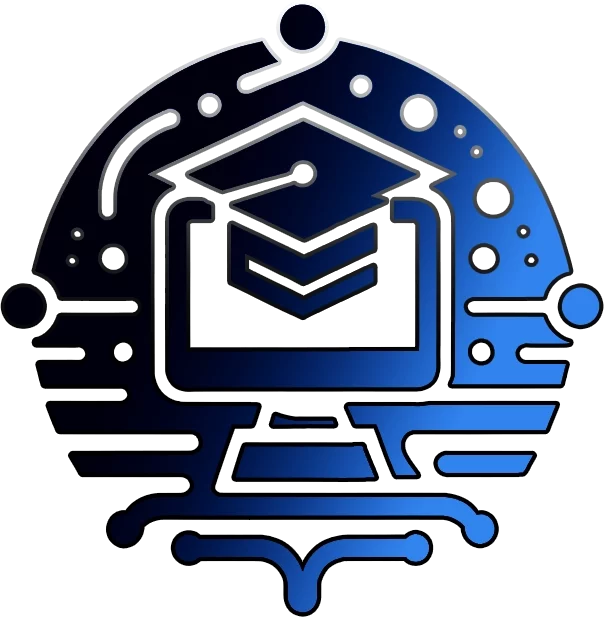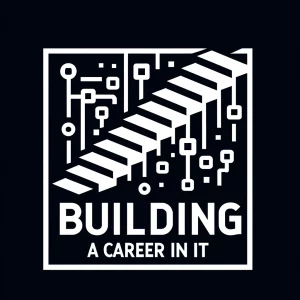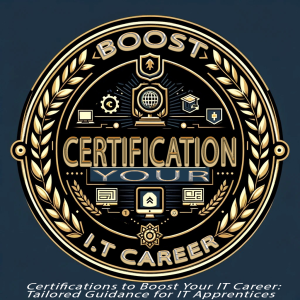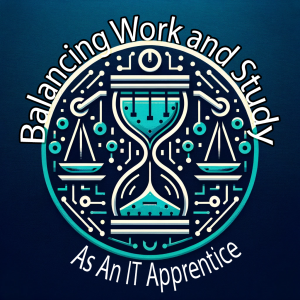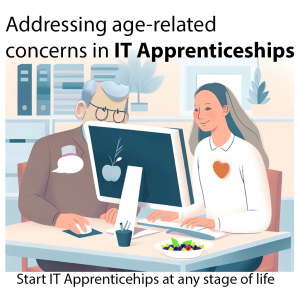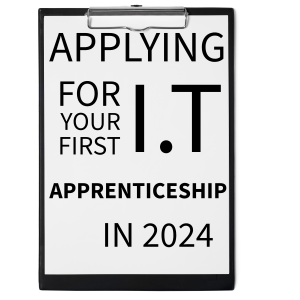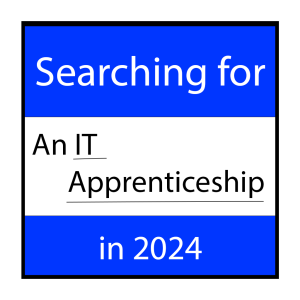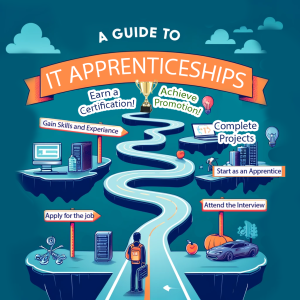As an IT apprentice, your journey into the tech industry is an exciting and challenging one. To excel in your role and lay the foundation for a successful career, it’s crucial to develop a strong set of both technical and soft skills. In this comprehensive guide, we’ll explore the Essential Skills for IT Apprentices that will help you thrive.

Technical Skills:
Programming and Scripting:
- Develop a solid understanding of programming concepts and familiarize yourself with popular languages such as Python, JavaScript, and PowerShell.
- Learn to write efficient and clean code, and practice automating tasks through scripting to streamline processes and improve productivity.
- From my personal experience, investing time in learning PowerShell has been incredibly valuable for automating repetitive tasks and managing Windows systems. I’ve used PowerShell extensively for tasks like user management, system monitoring, and report generation. Don’t underestimate the power of scripting languages like PowerShell and Python in making your work more efficient and effective.
- I recommend starting with basic programming concepts like variables, loops, and conditional statements, and then moving on to more advanced topics like functions, modules, and object-oriented programming. Online resources like Codecademy, HackerRank, and LeetCode are great for practicing your programming skills and learning new concepts.
Networking and Infrastructure:
- Gain knowledge of network protocols, topologies, and security best practices.
- Understand the fundamentals of server infrastructure, including virtualization, cloud computing, and storage solutions.
- In my experience, having a solid understanding of networking concepts like TCP/IP, subnetting, and DNS has been crucial in troubleshooting connectivity issues and designing robust network architectures. I recommend getting hands-on experience with networking tools like Wireshark, Nmap, and Cisco Packet Tracer to deepen your understanding of how networks operate.
- Familiarize yourself with common networking devices such as routers, switches, and firewalls, and learn how to configure and troubleshoot them.
- I’ve found that building a home lab with virtualization software like VMware or VirtualBox is an excellent way to gain practical experience with server infrastructure and networking. You can create virtual machines, set up different network topologies, and experiment with various operating systems and applications in a safe and controlled environment.
Operating Systems and System Administration:
- Develop expertise in popular operating systems like Windows, Linux, and macOS.
- Learn how to install, configure, and manage operating systems, as well as deploy and maintain software applications.
- In my roles, I’ve worked extensively with Windows Server, Active Directory, and Group Policy for managing user accounts, permissions, and system configurations. I recommend getting comfortable with the command line interfaces of different operating systems, as they offer powerful tools for automation and troubleshooting.
- Understand the principles of user and group management, file permissions, and system security.
- I’ve found that understanding the fundamentals of system hardening, patch management, and access control is essential for maintaining the security and stability of IT systems. Tools like Microsoft’s Security Compliance Toolkit and CIS benchmarks are great resources for learning about best practices in system security.
Database Management:
- Gain knowledge of relational databases and SQL (Structured Query Language) for data manipulation and retrieval.
- Familiarize yourself with database design principles, data modeling, and performance optimization techniques.
- In my experience, having a good grasp of SQL and database design has been invaluable for working with data-driven applications and performing data analysis. I recommend practicing SQL queries on sample databases and exploring concepts like normalization, indexing, and query optimization.
- Explore popular database management systems like MySQL, PostgreSQL, and Microsoft SQL Server.
- I’ve worked with both MySQL and SQL Server in my roles, and I’ve found that understanding the specific features and tools of each platform is important for effective database management. Online resources like W3Schools and SQL Zoo are great for learning SQL and practicing your skills.
Cybersecurity:
- Understand the fundamentals of information security, including common threats, vulnerabilities, and mitigation strategies.
- Learn about network security, secure coding practices, and data protection regulations such as GDPR and HIPAA.
- In my experience, staying up-to-date with the latest security trends and best practices is crucial for protecting against evolving cyber threats. I recommend following security blogs and podcasts, participating in online forums and communities, and attending security conferences and workshops to stay informed and connected with the security community.
- Stay updated on the latest security trends, tools, and best practices to safeguard systems and data.
- I’ve found that hands-on experience with security tools like Nmap, Wireshark, and Metasploit is invaluable for understanding how vulnerabilities can be exploited and how to defend against them. Platforms like HackTheBox and VulnHub offer great resources for practicing your offensive and defensive security skills in a safe and legal environment.
- In my roles, I’ve been involved in implementing security best practices like multi-factor authentication, encryption, and incident response planning. I recommend familiarizing yourself with frameworks like NIST and ISO 27001 for guidance on implementing comprehensive security controls and policies.
Developing a strong foundation in these technical skills takes time and practice, but the effort is well worth it. As an IT apprentice, you have the opportunity to learn from experienced professionals and gain hands-on experience with a wide range of technologies and tools.
I recommend setting goals for yourself, like earning relevant certifications or completing personal projects, to keep yourself motivated and track your progress. Don’t be afraid to ask questions, seek feedback, and learn from your mistakes. The tech industry is constantly evolving, so a commitment to continuous learning and growth is essential for long-term success.
Remember, your technical skills are just one part of the equation. Soft skills like communication, problem-solving, and teamwork are equally important for success in the IT industry. Make sure to cultivate these skills alongside your technical expertise, and you’ll be well on your way to a rewarding and fulfilling career in IT.
Soft Skills:
Communication:
- Develop strong verbal and written communication skills to effectively convey technical concepts to both technical and non-technical audiences.
- Practice active listening and ask clarifying questions to ensure clear understanding of requirements and expectations.
- Learn to provide constructive feedback and collaborate effectively with team members, stakeholders, and clients.
Problem-Solving:
- Cultivate a logical and analytical approach to problem-solving, breaking down complex issues into manageable components
- Develop a curiosity to investigate root causes and explore multiple solutions before making decisions.
- Embrace challenges as opportunities for growth and learning, and persist in the face of obstacles.
Adaptability and Continuous Learning:
- Embrace change and be open to new technologies, methodologies, and approaches in the rapidly evolving tech industry.
- Develop a growth mindset and actively seek out opportunities for continuous learning and skill development.
- Stay updated on industry trends, attend workshops and conferences, and engage in self-directed learning through online courses and certifications.
Time Management and Organization:
- Learn to prioritize tasks, set realistic goals, and manage your time effectively to meet deadlines and deliver quality work.
- Use project management tools and techniques to plan, track, and document your work, ensuring transparency and accountability.
- Develop a system for organizing and maintaining technical documentation, code repositories, and other essential resources.
Teamwork and Collaboration:
- Foster a positive and collaborative work environment by actively contributing to team discussions, sharing knowledge, and supporting your colleagues.
- Understand the importance of diversity and inclusion in the workplace, and respect different perspectives and ideas.
- Learn to work effectively in cross-functional teams, communicating clearly and aligning efforts towards common goals.
Customer Service:
- Develop a customer-centric mindset, focusing on understanding and meeting the needs of both internal and external customers.
- Practice empathy and patience when dealing with technical issues, and strive to provide timely and effective solutions.
- Learn to communicate technical concepts in a clear and non-technical manner, ensuring that customers feel heard and supported.
Developing Your Skills:
Hands-on Experience:
- Actively seek out opportunities to apply your skills in real-world scenarios, whether through projects at work or personal side projects.
- Volunteer for additional responsibilities and challenges that allow you to stretch your abilities and gain exposure to new technologies and concepts.
- Participate in hackathons, coding competitions, and open-source projects to further develop your skills and network with other professionals.
Mentorship and Guidance:
- Seek out mentors within your organization or professional network who can provide guidance, advice, and support throughout your apprenticeship and beyond.
- Engage in regular discussions with your mentor, sharing your goals, challenges, and progress, and be open to feedback and constructive criticism.
- Pay it forward by mentoring others as you grow in your career, sharing your knowledge and experiences to help others succeed.
Training and Certifications:
- Take advantage of training programs and certifications offered by your employer or educational institution to deepen your knowledge and demonstrate your expertise.
- Pursue industry-recognized certifications such as CompTIA A+, Network+, Security+, or vendor-specific certifications like Microsoft Certified Solutions Associate (MCSA) or Cisco Certified Network Associate (CCNA).
- Attend workshops, webinars, and conferences to stay updated on the latest trends and best practices in the IT industry.
As an IT apprentice, developing a strong foundation of technical and soft skills is essential for success in the tech industry. By focusing on programming and scripting, networking and infrastructure, operating systems and system administration, database management, cybersecurity, and cloud computing, you’ll be well-equipped to tackle the challenges and opportunities that come your way.
Equally important are the soft skills that enable you to communicate effectively, solve problems, adapt to change, manage your time, collaborate with others, and provide excellent customer service. These skills, combined with a commitment to continuous learning and growth, will set you apart as a valuable asset to any organization.
Remember, your apprenticeship is just the beginning of a lifelong journey in the tech industry. Embrace the challenges, seek out opportunities for growth, and never stop learning. With dedication, perseverance, and a passion for technology, you’ll be well on your way to a successful and rewarding career as an IT professional.
Next guides in the series |
Guide to IT Apprenticeships: Overview of different types of apprenticeships, what they entail, and which might be right for different interests and skills.
https://theitapprentice.com/blog/guide-to-it-apprenticeships/Searching for an IT Apprenticeship in 2024: How to find your next IT job as an apprentice in 2024 and use advanced techniques and methods to find them
https://theitapprentice.com/blog/searching-for-an-it-apprenticeship-in-2024/Applying for Your First IT Apprenticeship: Step-by-step application process, tips for standing out, and common mistakes to avoid.
https://theitapprentice.com/blog/applying-for-an-it-apprenticeship-in-2024/Age Is Just a Number: Addressing age-related concerns in IT apprenticeships, showcasing examples of successful apprentices from various age groups.
https://theitapprentice.com/blog/age-is-just-a-number/Building a Career from an IT Apprenticeship: How to leverage an apprenticeship for career advancement, using your career as a case study.
https://theitapprentice.com/blog/building-a-career-from-an-it-apprenticeship/Essential Skills for IT Apprentices: Key technical and soft skills that will help apprentices excel in their roles.
https://theitapprentice.com/blog/essential-skills-for-it-apprentices/- What to Expect in Your First Year as an IT Apprentice: Month-by-month guide of challenges and milestones.
https://theitapprentice.com/blog/what-to-expect-in-your-first-year-as-an-it-apprentice/ - Balancing Work and Study as an IT Apprentice: Tips for managing time effectively, based on your personal experiences.
https://theitapprentice.com/blog/balancing-work-and-study-as-an-it-apprentice-tips-for-managing-time-effectively/ - Navigating the First Job Offer Post-Apprenticeship: How to evaluate job offers, negotiate salaries, and decide the best path forward.
https://theitapprentice.com/blog/navigating-the-first-job-offer-post-apprenticeship/ - Certifications to Boost Your IT Career: Recommendations on certifications that are beneficial for apprentices, tailored to different IT paths.
https://theitapprentice.com/blog/certifications-to-boost-your-it-career-tailored-guidance-for-it-apprentices/
Join Our Community!
🌟 Get exclusive insights and the latest IT tools and scripts, straight to your inbox.
🔒 We respect your privacy. Unsubscribe at any time.
